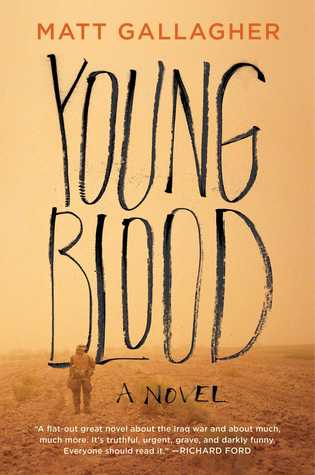 Fiction
Fiction
Released February 2, 2016
352 Pages
Bottom Line: Read it…if you’re interested in the life of a contemporary soldier.
Affiliate Link: Buy from Amazon
Source: Publisher (Atria Books) via NetGalley
Headline
Though I initially had trouble focusing on this story, the personal side of war and its complexities had me captivated by the second half. It’s going on my Books for Guys and Coed Book Club Recommendations lists.
Plot Summary
Infantry Lieutenant Jack Porter (“LT”) faces countless challenges within his unit and from above during his final days of fighting the insurgency outside of Ashuriyah, Iraq and is haunted by the mysterious disappearance of an American soldier from a previous deployment.
Why I Read It
I was curious about the soldier’s experience in the Iraq counterinsurgency and this debut novel was blurbed by Phil Klay (author of 2014 National Book Award for Fiction winner Redeployment).
Major Themes
Iraq War (specifically the counterinsurgency phase), soldier’s daily life, partnering with Iraqis in the war effort, effects of war on soldier’s ability to relate to family and friends back home, leadership complexities
What I Liked
- Youngblood is not a traditional “war” book (i.e. containing mostly battle strategy and play by play). Rather, it’s about the personal side of war…what it’s like to be stationed in a desolate area where nothing much happens, until it does. You get a strong sense of the boredom and daily minutiae of “outpost” life…and how that can instantly explode into a life threatening situation.
- The parts I most enjoyed were LT’s struggles with his leadership position on the ground, but still having to answer to the brass back at the base and above. LT manages extreme complexity and his attempts to navigate this in a responsible and moral way captivated me.
- I was touched by LT’s struggle to relate to his family and loved ones back home. His life is so far removed from theirs…how does he even tell them stories about what goes on in his typical day? He avoids calling his parents and lashes out at his high school sweetheart. He even has trouble connecting with his ex-soldier brother, who mentors him through some tough situations. But, how can you expect anything different from him given what he’s living through? It’s a tragedy that I’m sure is frequently repeated in real life among soldiers and their loved ones.
- The interactions and relationships between the Americans and the local population are at the crux of this story in multiple ways. The Americans rely on the locals as intel sources and partners in fighting the insurgency and this gets incredibly complicated. Who should the Americans trust? How do they balance trying to help the innocent locals with following military procedure and stamping out the insurgency? What happens when relationships become dangerously entangled?
- Gallagher is a former U.S. Captain and veteran of the Iraq war, so I obviously wondered how much of this novel is actually truth…or based on the truth. Here’s what Gallagher says on that topic in Pen America (and some more interesting tidbits can be found on his Wikipedia page):
Certainly my project is influenced and informed by my own experiences in Iraq, but I’ve learned the most by reading accounts by journalists, civilians, and soldiers who were there before (sometimes long before) or after me. – Matt Gallagher
What I Didn’t Like
- There is a lot going on in this book, especially in the beginning. I was initially overwhelmed by the military terminology and slang amongst the soldiers. I had trouble keeping track of who was who, especially the local Iraqis, sheiks, and warlords (many of them have nicknames and aliases), though it got easier to follow the farther I read (and I started taking notes).
- I should mention that I had a pretty bad cold while reading the first half, so my ability to focus wasn’t top notch…and the NyQuil haze of my bedtime reading made things even worse. I’m pretty sure my state of mind played into my initial confusion with the story, but I can’t be positive.
A Defining Quote
It’s not that he lacks a conscience, I decided. It’s that the one he has is broken in the center, because that’s what going to war over and over again does to people.
Good for People Who Like…
Books about war, books that make you think, gorgeous writing
Other Books You May Like
Nonfiction dealing with PTSD in soldiers returning from Iraq:
Thank You For Your Service by David Finkel

I enjoyed your thoughtful review Sarah. I was wondering if this was listed under fiction or non-fiction. It’s good to know it is characterized as fiction based on a conglomeration of accounts. Sound like a very meaningful story.
Thank you! Definitely fiction, but drawing on real life experience it sounds like.
That sounds tough but important.
I just realized that except for The Things They Carried, I haven’t really read a proper war book. I have read plenty with soldiers as characters in a book about something other than war. This one sounds pretty good – I prefer to read about the personal side of war than about the actual war itself – something the husband and I differ in greatly. This one sounds like a perfect start but I will remember not to listen to this book on audio because I am bad at keeping characters straight too.
I’m with you on preferring war books that focus on the personal 🙂 And, yes, I think I would have had trouble with this one on audio!
I guess books like this are important because war and soldiering are topics rarely discussed these days, not on social media, not in the news (except for stats on how many killed and those horrific photos.) I have two sons who happened to grow up in years when there was no war to go to, no draft, etc. Big relief to me as a mother. Then again I have a nephew who was sent to Iraq from the Reserves and seemed to come back unharmed in any way (though he never talks about it.) When I started My Big Fat Reading project, reading books from the 1940s, I was stunned to find that most of them were, deep down, anti-war novels. Maybe if more women read war novels of this type, we would work harder to put an end to this form of resolving differences.
Yep – I grew up in a time of peace as well and I think we all sort of lived in la-la land.
Oops. I meant to add that many of the 1940s novels were war novels.
First, I love your review format!!
I wish this book had existed when I was working at the VA last year as a psychology intern. There were a couple of patients who felt it was difficult to work with me because I was a civilian and couldn’t understand their experiences. While a book wouldn’t fix that, I think this would have been helpful, and I would have been more likely to this one up since I lean on fiction more than nonfiction outside of academia.
Thank you!
And – I do think this would have been beneficial in your role. There’s another nonfiction that I loved, Thank You For Your Service by David Finkel. Yes, it’s nonfiction, but I found it fascinating.
I read Redeployment last year and definitely remember being bogged down by the slang in that one as well. I feel a bit undecided on this one, so I’ll have to think on it awhile. I do like the idea of reading something on, like you said, the personal side though.
I didn’t get a chance to read Redeployment, but it was definitely on my radar. Why can’t they just put a little glossary in there for the terms?! The slang especially…as it’s not on the Kindle dictionary feature.
I love the quote! Redeployment was on my tbr when it first released, but I dismissed it for the beauty of other books. I normally love books with military themes, characters, outlines, etc. I had no idea this one was so deep in the military subgenre (what I get for not looking at it closely). It’s one I think I’d like but probably not put it as a high priority for now.
I’m on the fence, like many others here. I’ll pop it in the filing cabinet at the back of my brain and see if it resurfaces. Great, thorough review! 🙂 Those darned colds will get you every time while reading.
Thank you 🙂 I felt like such a weeny getting so out of sorts b/c of a cold, but that one really did me in!
This one sounds right my alley. I read a fictionalized novel last year about boredom in war zones written by a journalist (The Shadow Patrol by Alex Berenson). It shocked me and I rejected the practices but it may very well be true.
I’ll have to check that one out! There might also be more boredom in a counterinsurgency effort than a different type of mission. Gallagher alluded to the differences in being stationed in Iraq during C.I. vs. when the US first invaded.